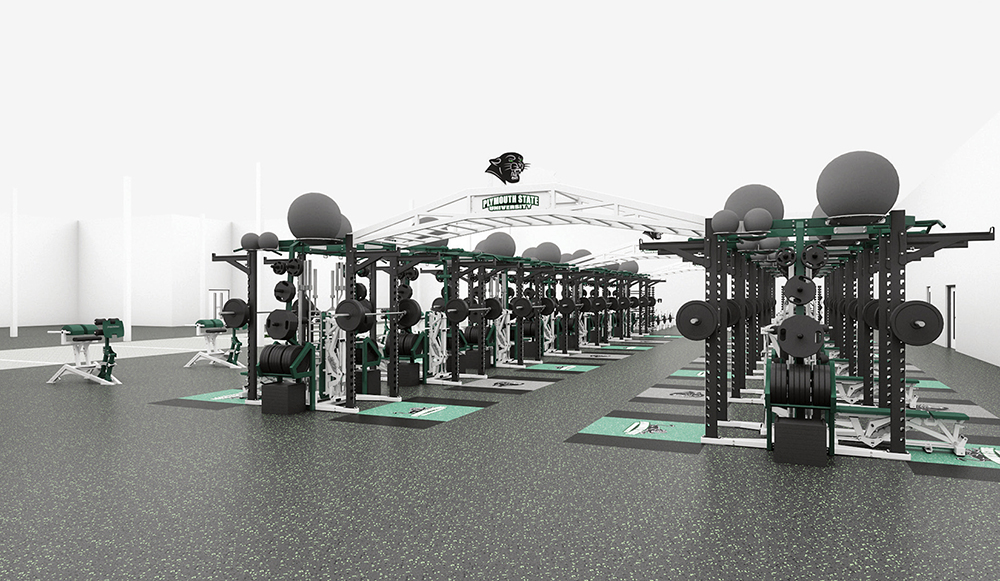Student athletes need both physical and mental perseverance to advance their skills. It is one of the many proficiencies that Plymouth State teaches.
Patrick Griffin ’19 is a good example of PSU’s well-rounded learning. He played goalie on his high school lacrosse team, but when he came to PSU he didn’t think his goal-tending skills measured up. He tried out for a field position, but didn’t make the cut.
Assistant Director of Athletics and Head Athletic Trainer Mark Legacy learned soon afterwards about Griffin’s goal-tending expertise, when, coincidentally, the team’s goalie was injured. Griffin stepped into the familiar role and worked hard in it all four years of his college career.
Even a surgery between Griffin’s first and sophomore years didn’t set him back, and he returned to campus rehabilitated and ready to train. This spring, as a senior, Griffin was recognized by his teammates for his gumption when chosen to wear the jersey of Zach Frank ’14, a well-respected alumni player who had recently passed away.

Professor Julie Bernier and students examine a “virtual cadaver” in the new Human Performance Center. Gil Talbot ’76 photo.
“He persevered through getting cut, getting injured,” says Legacy, noting that Griffin has also worked hard as an athletic training student, successfully passing the national athletic training Board of Certification exam to become a certified athletic trainer upon graduation. “He stayed with it.”
“You can’t let self-doubt stop you from achieving, so mental perseverance is as important as physical,” says Professor Julie Bernier, co-coordinator of the Health and Human Enrichment Cluster. “We help athletes conquer their struggles with frustrations, setbacks, depression, and anxiety. In almost all cases, they persevere.”

Both Legacy and Bernier are excited that students are now benefiting from a new, state-of-the-art teaching facility. The $10 million Human Performance Center opened in January with classrooms, activity areas, and high-tech equipment. Set within the former Field House in the Physical Education Center, the new center bolsters student efforts to endure and excel and offers a home base for a range of programs.
The center’s laboratories for classes and research, together with several Open Lab spaces, lend themselves to collaboration in step with PSU’s Integrated Clusters learning model.
“It’s an incredible space—bright, airy, and beautiful,” says Bernier. “Students have lots of space to study and work together, and the classrooms and laboratories are state of the art.”

The Health and Human Performance programs have roughly 450 students majoring in six program areas, and about 1,000 students who are non-HHP majors also take classes in the new center. “The space is very well used and a welcome addition to campus,” says Bernier. “Students are learning with the best, most contemporary equipment in their fields.”
The University’s current Vailas Performance Center is about 1,700 square feet and far too small to serve current student demand, and plans call for the HPC’s lower level to be the future home of PSU’s new Strength and Conditioning Open Laboratory. Bernier says students will complete laboratory courses as well as practicums and internships with John “JT” Thomas, PSU’s new and highly-experienced strength and conditioning director.
Students in the bachelor’s in exercise and sport physiology and the master’s in athletic training programs will develop strength and conditioning programs for PSU athletes and work with injured individuals in functional rehabilitation. The equipment in the new Strength and Conditioning Lab—including free weights and apparatus that test students’ power output—will enable PSU to better recruit and retain students and student athletes.

“Our students will get exposed to all the best technology that is available out there,” Thomas says.
John “JT” Thomas, PSU’s new strength and conditioning director, has coached championship teams, All Americans, postseason award-winners, and first-round NFL draft picks. His strength and conditioning postings include the University of Miami, University of Georgia, and Penn State, among others, and he has coached university baseball and football teams.
JT has been recognized by his profession with the National Collegiate Strength and Conditioning Coach of the Year award, but perhaps his greatest achievement are his numerous graduate assistants who have gone on to become collegiate or professional-level strength coaches or personal trainers
Within the next year, Thomas will initiate an internship program. “I’ll incorporate physical therapy and athletic training into the experience, and not just preparation but training modifications to get athletes ready for competition again,” he says.
He adds, “We will continually grow the program and generate interest to make sure people know this is the direction we are headed. Once the facility is done, students won’t have to look elsewhere for internships and practicums.”
■ Janice Beetle
For information about supporting this Open Laboratory through a philanthropic investment or bequest, please contact Vice President for University Advancement Paula Lee Hobson at phobson@plymouth.edu, (603) 535-2901, or Director of Development John Scheinman ’19P at jscheinman@plymouth.edu, (603) 535-2805.








